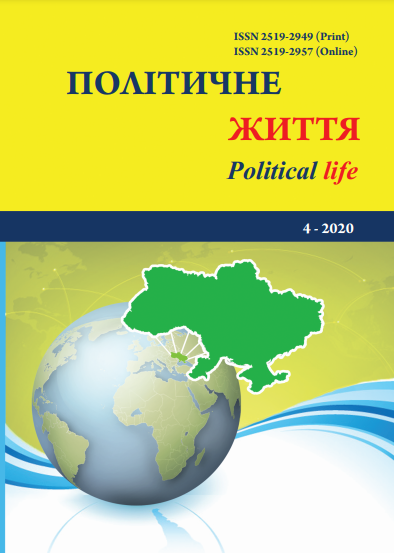Democratization dynamics in the Czech Republic: between divergence and convergence
DOI:
https://doi.org/10.31558/2519-2949.2020.4.1Keywords:
the Czech Republic; democratization; power; opposition; political parties; divergence; convergenceAbstract
The paper studies the democratization dynamics in the Czech Republic in the context of interrelations between the power and the opposition. For modeling of the democratization process, we have applied the basic principle of synergetics – the principle of subordination. The interdependence of the democratization state and its parameters has been established. For the trend dynamics of democratization of the state political system, reproduced with the help of indicators in a modeled form, periods of fluctuation and its main phases – divergence and convergence are typical. It has been established that parliamentary elections are typical fluctuation points. They provide agents with the possibility to legitimately implement the election strategy and to change the vector of democratization in a constitutional way, to determine the short- or long-term implementation of the strategy of the ruling party or its leader, which, under conditions of greater total social capital helps either deterrence or stratification forces in their coming to power, triggering the dissipative democratization of the political system.
Based on the analysis of the democratization trend, we have identified the defining points that recorded the stoppage of democratization and its entry into the fluctuation phase. This state of the system has been defined as the result of achieving a certain balance between the power and the opposition, as the prolongation of the established "rules of the game", according to which the parties bore minimal transaction costs, reducing thus inter-party competition and institutional stability. It has been proved that after a certain stabilization, comes the stage at which the level of democracy of the political system reduces to a new saturation point (convergence). The study has revealed an unfinished cycle of fluctuation, which had manifested itself in the trend towards the convergence of democratization of the political system of the Czech Republic. Based on the analysis of indicators and modern political processes in the country, it has been found that democratization took place against the background of the permanent formation and preservation of two opposite poles in the political field.
References
Mansfeldová Z., Rakušanová P. The quality of democracy in the Czech Republic. RECON. Online Working Paper. 2010. No 14. August. URL: www.reconproject.eu/projectweb/portalproject/RECONWorkingPapers.html (дата звернення: 25.08.2017).
Банс В. Порівняльна демократизація. Широкі та обмежені узагальнення. У пошуках правильної парадигми: концептуальні перспективи посткомуністичного переходу у країнах Східної Європи / ред. Д. Гузіни; пер. з англ. Ю. Некрутенка. Київ: Ай Бі, 2003. С. 107 – 139.
Вахудова М. Нерозділена Європа. Демократія, важелі впливу та інтеграція після комунізму / пер. з англ. Т. Цимбал. Київ: Видавничий дім «Києво-Могилянська академія», 2009. 379 с.
Grzymała-Busse A. Political competition and the politicization of the state in East Central Europe. Comparative Political Studies. 2003. Vol. 36, No 10. December. P. 1123 – 1147.
Сорокин П. Человек. Цивилизация. Общество / ред. А. Союмонов; пер. с англ. С. Сидоренко. Москва: Политиздат, 1992. 543 с.
BTI. URL: https://atlas.bti-project.org/share.php?1*2018*TV:SDS1:MAP*DOA* TOPO: REGION:TOF (дата звернення: 06.07.2019).
Freedom House. 2003. URL: https://freedomhouse.org/report/freedom-world/freedom-world-2003 (дата звернення: 21.09.2019).
Kaufmann D., Kraay A., Mastruzzi M. The Worldwide Governance Indicators. Methodology and Analytical Issues. 2017. URL: www.govindicators.org (дата звернення: 15.07.2020).
Worldwide Governance Indicators. URL: https://info.worldbank.org/ governance/ wgi/Home/Reports (дата звернення: 21.09.2019).

